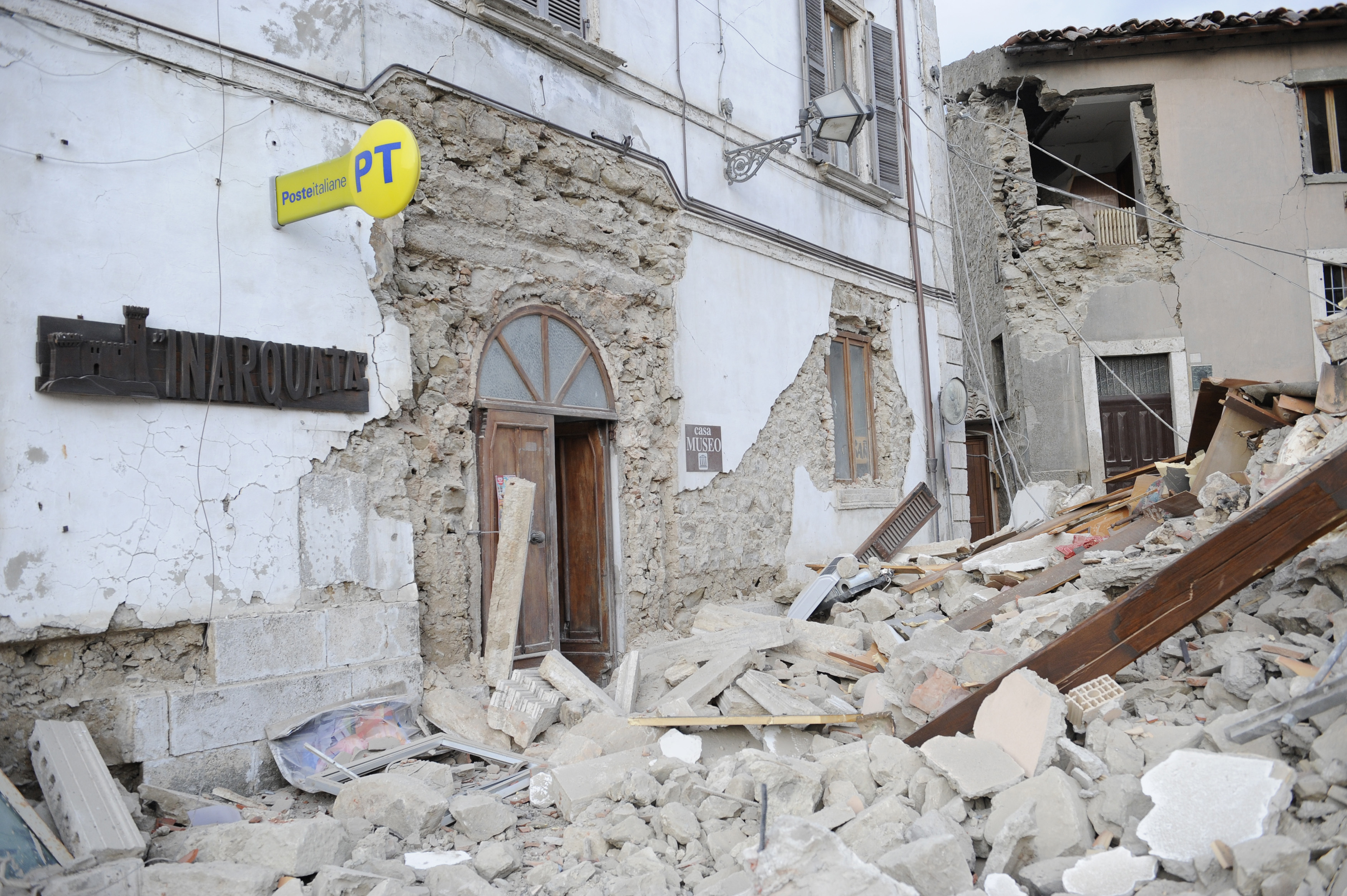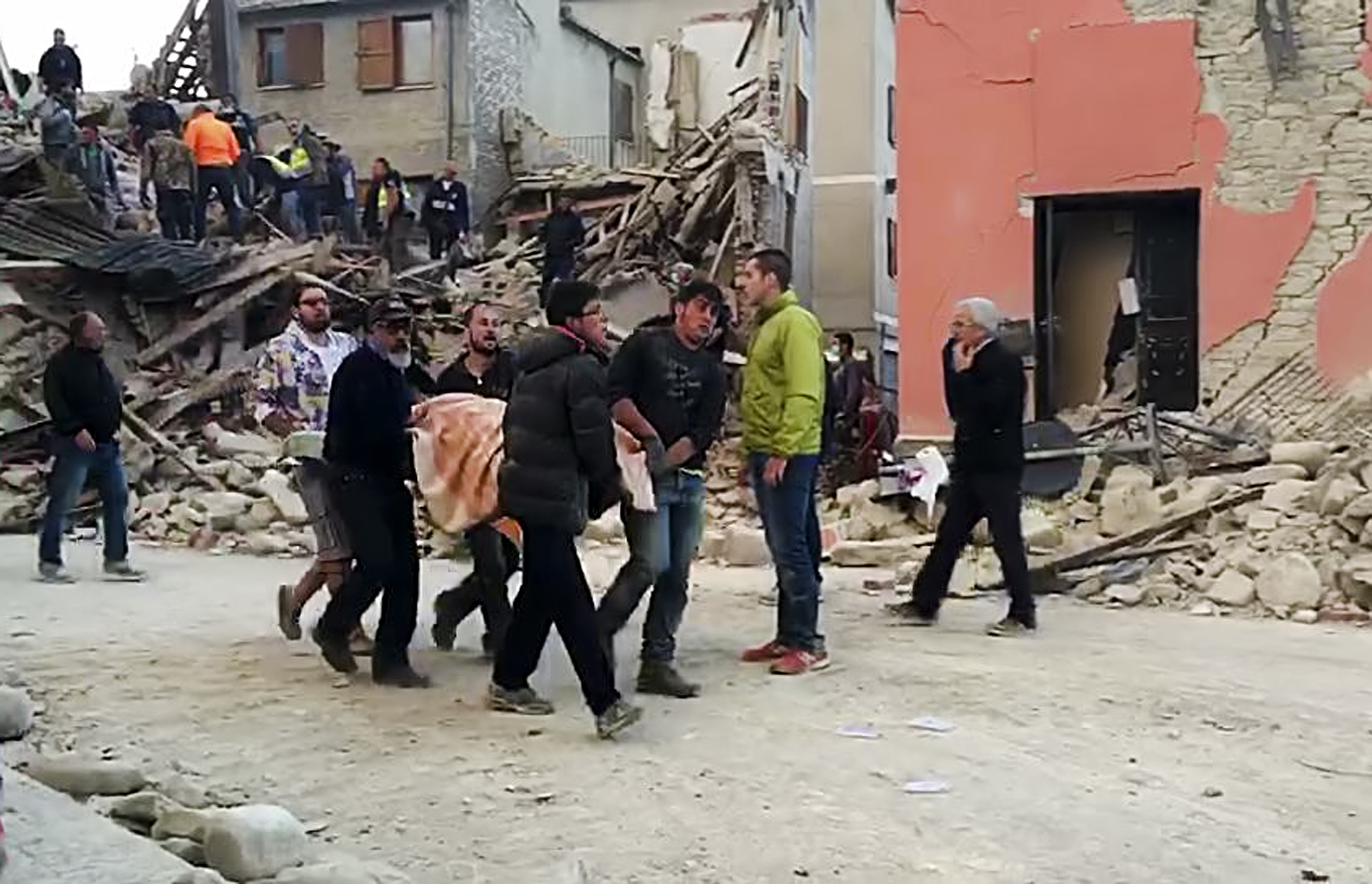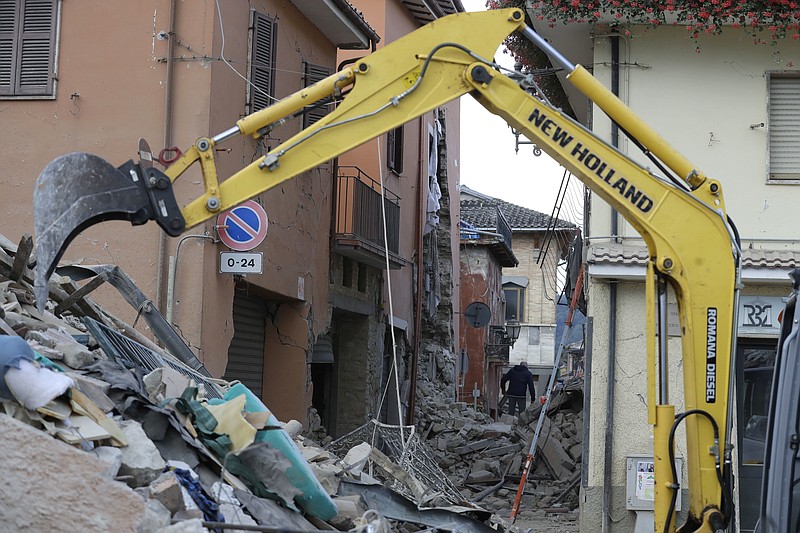 A post office is engulfed by rubbles in Arcuata del Tronto, central Italy, where a 6.1 earthquake struck just after 3:30 a.m., Wednesday, Aug. 24, 2016. The quake was felt across a broad section of central Italy, including the capital Rome where people in homes in the historic center felt a long swaying followed by aftershocks. (AP Photo/Sandro Perozzi)
A post office is engulfed by rubbles in Arcuata del Tronto, central Italy, where a 6.1 earthquake struck just after 3:30 a.m., Wednesday, Aug. 24, 2016. The quake was felt across a broad section of central Italy, including the capital Rome where people in homes in the historic center felt a long swaying followed by aftershocks. (AP Photo/Sandro Perozzi)  This still image taken from video shows rescuers recover a victim from a crumbled building in Amatrice, central Italy, where a 6.1 earthquake struck just after 3:30 a.m., Wednesday, Aug. 24, 2016. The quake was felt across a broad section of central Italy, including the capital Rome where people in homes in the historic center felt a long swaying followed by aftershocks. (AP Photo)
This still image taken from video shows rescuers recover a victim from a crumbled building in Amatrice, central Italy, where a 6.1 earthquake struck just after 3:30 a.m., Wednesday, Aug. 24, 2016. The quake was felt across a broad section of central Italy, including the capital Rome where people in homes in the historic center felt a long swaying followed by aftershocks. (AP Photo) AMATRICE, Italy - A strong earthquake rocked central Italy early Wednesday, collapsing homes on top of residents as they slept. At least 11 people were reported dead in two hard-hit towns where rescue crews raced to dig survivors out of the rubble, but the toll was expected to rise as crews reached homes in more remote hamlets.
"The town isn't here anymore," Amatrice mayor Sergio Pirozzi said.
The magnitude 6 quake struck at 3:36 a.m. (0136 GMT) and was felt across a broad swath of central Italy, including Rome, where residents felt a long swaying followed by aftershocks. The temblor was felt from the Lazio region into Umbria and Le Marche on the Adriatic coast.
The hardest-hit towns were Amatrice and Accumoli near Rieti, some 100 kilometers (80 miles) northeast of Rome, where the air was thick with dust and smelled strongly of gas. The center of Amatrice was devastated, with entire buildings razed. Rocks and metal tumbled onto the streets and dazed residents huddled in piazzas as some 39 aftershocks continued into the early morning hours, some as strong as 5.1.
"The whole ceiling fell but did not hit me," marveled resident Maria Gianni. "I just managed to put a pillow on my head and I wasn't hit luckily, just slightly injured my leg."
Another woman, sitting in front of her destroyed home with a blanket over her shoulders, said she didn't know what had become of her loved ones.
"It was one of the most beautiful towns of Italy and now there's nothing left," she said, too distraught to give her name. "I don't know what we'll do."
As daylight dawned, residents, civil protection workers and even priests began digging out with shovels, bulldozers and their bare hands, trying to reach survivors. There was relief as a woman was pulled out alive from one building, followed by a dog.
"We need chain saws, shears to cut iron bars, and jacks to remove beams: everything, we need everything," civil protection worker Andrea Gentili told The Associated Press. Italy's national blood drive association appealed for donations to Rieti's hospital.
The devastation harked back to the 2009 quake that killed more than 300 people in and around L'Aquila, about 90 kilometers (55 miles) south of the latest quake. The town sent emergency teams Wednesday to help with the rescue.
"I don't know what to say. We are living this immense tragedy," said the Rev. Savino D'Amelio, an Amatrice parish priest. "We are only hoping there will be the least number of victims possible and that we all have the courage to move on."
The Italian geological service put the magnitude at 6.0; the U.S. Geological Survey reported 6.2 with the epicenter at Norcia, about 170 kilometers (105 miles) northeast of Rome, and with a relatively shallow depth of 10 kilometers (6 miles).
"Quakes with this magnitude at this depth in our territory in general create building collapses, which can result in deaths," said the head of Italy's civil protection service, Fabrizio Curcio. He added that the region is popular with tourists escaping the heat of Rome, with more residents than at other times of the year, and that a single building collapse could raise the toll significantly.
The mayor of Accumoli, Stefano Petrucci, told state-run RaiNews24 at least six people had died there, including a family of four, and two others.
In Amatrice, the ANSA news agency reported two bodies were pulled from one building. The Rev. Fabio Gammarota told ANSA another three were killed in a separate collapse.
In Amatrice, Pirozzi told state-run RAI radio and Sky TG24 that residents were buried under collapsed buildings, that the lights had gone out and that heavy equipment was needed to clear streets clogged with debris.
Premier Matteo Renzi's office tweeted that heavy equipment was on its way.
A 1997 quake killed a dozen people in the area and severely damaged one of the jewels of Umbria, the Basilica of St. Francis in Assisi, filled with Giotto frescoes. The Franciscan friars who are the custodians of the basilica reported no immediate damage from Wednesday's temblor.
